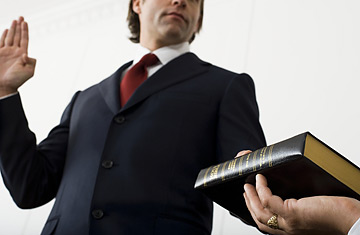
A man takes an oath over the Bible.
On Tuesday the City Council in Madison will vote whether elected officials or city appointees can add to their oath of office, in which they swear to uphold the state and federal constitutions, a rejection of the parts they don't like. It started when Wisconsin amended its constitution to ban gay marriage, and a member of the city's Equal Opportunities Commission resigned rather than swear the traditional oath. Members of that board in particular, which is charged with protecting civil rights, felt torn about promising to uphold laws they felt were discriminatory. So the Council will debate whether public servants, during their swearing-in, can state that the oath was taken under protest and vow to work to strike "this section from the constitution and work to prevent any discriminatory impacts from its application." That way, supporters of the "anti-oath" say, they can take the oath with a clear conscience.
That comes awfully close to letting officials pick which laws they want to enforce. And that doesn't seem like the most promising way to usher them into office. The oath sworn by public servants, starting with the President of the United States, is the closest thing to a sacred act of all our democratic traditions. Candidates may be partisan brawlers when they run for office; campaigning is a contact sport that you play to win or not at all. But once elected, they're born again as servants of all the people, and taking the oath is an act of both exaltation and submission; we're giving you this power, now promise to play by the rules we've laid down.
This is such a core piece of democratic faith, that when you disagree with a law you work to change it, or — in the tradition of civil disobedience — you break it and suffer the consequences. So you can respect the city commissioner who didn't feel he could even implicitly endorse a gay marriage ban and would rather resign than pretend. But what happens if you let officials take office with an asterisk in their oath? That would "come perilously close to saying [that] in their duties they will ignore the law or alter the law when it conflicts with their personal principles," UW-Madison political science professor Howard Schweber told the Wisconsin State Journal. "That is a fundamental breach of the duty of office."
All kinds of asterisks have been proposed over time: President Bush's affinity for signing statements (more than 500 in his first term alone) fall into this category: when he doesn't want to veto a law, he just asserts that it doesn't apply to him. Biotech entrepreneur Paul Abrams proposes that if the law funding embryonic stem cell research survives a Bush veto, Congress should allow for another little box on tax returns letting people check off whether they agree for their tax dollars to be used for research. "This mechanism would provide active acknowledgement of people's deeply held views," he argues, "without compromising hESC research and development."
On the surface these appear like classic democratic efforts to respect the rights and deeply held principles of minorities. But people feel just as deeply about gun control and abortion and global warming and, of course, war and peace. We can customize our tax returns to reflect the policies we're willing to support and our oaths of office to reflect the laws we're willing to enforce. But at that point democracy as a miraculous system of respectful accommodation shatters.
"Our Constitution," FDR said, "was not a perfect instrument, it is not perfect yet; but it provided a firm base upon which all manner of men of all races, colors and creeds could build our solid structure of democracy." That base becomes less firm when public servants, whether President or city commissioner, get to remove whichever pieces they dislike.
